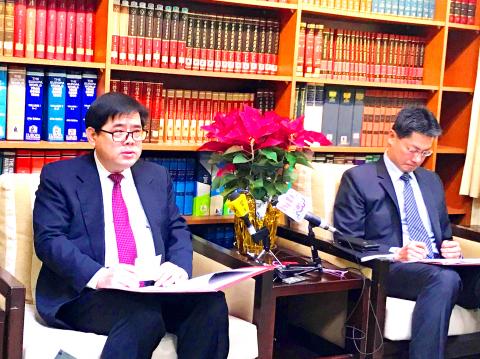The Presidential Office yesterday thanked the US for briefing Taiwan in advance on its latest National Security Strategy report and for reiterating its commitment to the Taiwan Relations Act in the document.
US President Donald Trump’s administration unveiled the report on Monday morning in Washington, mentioning Taiwan in its section on the Indo-Pacific region.
Presidential Office spokesman Sidney Lin (林鶴明) said that the US briefed Taiwan on the report in Taipei on Monday afternoon.

Photo: Peng Wan-hsin, Taipei Times
The guiding principles outlined in the US report as part of a strategy to bring about a free and open Indo-Pacific region, including promotion of free and fair trade and joining forces with its allies to deter threats, are “in line with our policy to pursue peace and stability in the region,” Lin said.
“We thanked the US for its prior briefing and its firm commitment to the Taiwan Relations Act,” he said.
As a member of the international community, Taiwan is committed to deepening cooperation and relationships with regional partners to contribute to the peace, stability and welfare of the region, Lin added.
The Ministry of Foreign Affairs expressed optimism about future Taiwan-US relations, saying the reference to the Taiwan Relations Act shows that Trump realizes the strategic importance of Taiwan in the Asia-Pacific region.
The government has paid close attention to and is highly interested in Trump’s “Indo-Pacific” strategy, which was proposed by the US president during his first trip to Asia last month, Department of North American Affairs Director-General Remus Chen (陳立國) said.
“We will continue to seek to understand what policies the US plans to adopt to carry out the initiative. We also hope to strengthen bilateral cooperation with Washington on various aspects under this new strategic framework,” Chen said.
Asked what role Taiwan could play in Trump’s Indo-Pacific strategy, Chen said that although the government is still conducting evaluations, it would not sit on the sidelines.
“Taiwan is situated in a coveted strategic location in East Asia and has consistently contributed to the maintenance of regional peace. As one of the stakeholders, it is impossible for us to sit on the sidelines when a major regional strategy is being formed,” he said.

TRAGEDY STRIKES TAIPEI: The suspect died after falling off a building after he threw smoke grenades into Taipei Main Station and went on a killing spree in Zhongshan A 27-year-old suspect allegedly threw smoke grenades in Taipei Main Station and then proceeded to Zhongshan MRT Station in a random killing spree that resulted in the death of the suspect and two other civilians, and seven injured, including one in critical condition, as of press time last night. The suspect, identified as a man surnamed Chang Wen (張文), allegedly began the attack at Taipei Main Station, the Taipei Fire Department said, adding that it received a report at 5:24pm that smoke grenades had been thrown in the station. One man in his 50s was rushed to hospital after a cardiac arrest

A car bomb killed a senior Russian general in southern Moscow yesterday morning, the latest high-profile army figure to be blown up in a blast that came just hours after Russian and Ukrainian delegates held separate talks in Miami on a plan to end the war. Kyiv has not commented on the incident, but Russian investigators said they were probing whether the blast was “linked” to “Ukrainian special forces.” The attack was similar to other assassinations of generals and pro-war figures that have either been claimed, or are widely believed to have been orchestrated, by Ukraine. Russian Lieutenant General Fanil Sarvarov, 56, head

SAFETY FIRST: Double the number of police were deployed at the Taipei Marathon, while other cities released plans to bolster public event safety Authorities across Taiwan have stepped up security measures ahead of Christmas and New Year events, following a knife and smoke bomb attack in Taipei on Friday that left four people dead and 11 injured. In a bid to prevent potential copycat incidents, police deployments have been expanded for large gatherings, transport hubs, and other crowded public spaces, according to official statements from police and city authorities. Taipei Mayor Chiang Wan-an (蔣萬安) said the city has “comprehensively raised security readiness” in crowded areas, increased police deployments with armed officers, and intensified patrols during weekends and nighttime hours. For large-scale events, security checkpoints and explosives

PUBLIC SAFETY: The premier said that security would be tightened in transport hubs, while President Lai commended the public for their bravery The government is to deploy more police, including rapid response units, in crowded public areas to ensure a swift response to any threats, President William Lai (賴清德) said yesterday after a knife attack killed three people and injured 11 in Taipei the previous day. Lai made the remarks following a briefing by the National Police Agency on the progress of the investigation, saying that the attack underscored the importance of cooperation in public security between the central and local governments. The attack unfolded in the early evening on Friday around Taipei Main Station’s M7 exit and later near the Taipei MRT’s Zhongshan